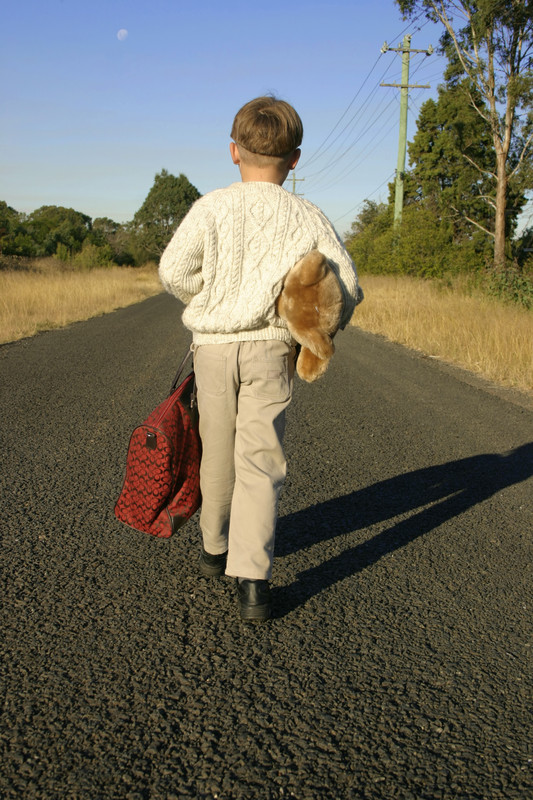The other week I wrote about preparing our kids for leaving home, having the emotional maturity to deal with being responsible for themselves and their actions and shaping themselves into a person who makes sensible choices and knows their path – or at least knows a way to point while they work out what path to be on. I loved Sally’s post on all the ‘other’ stuff a child needs to learn and our responsibilities to help them achieve those. But in my post I glossed over the practical elements of life outside the family nest in one quick point and an interesting twitter chat developed last week about things you really do need to know before setting off into the big wide world. Things that, until recently, didn’t feature in the school curriculum at all and probably still are learned by costly mistakes as much as by experience.

(c) Can Stock Photo
So what would it be really great to know how to do before you packed up and headed for the hills (or uni halls) of the big wide world?
- How to cook. If you’ve been part of a medium or large family, cooking for one – and on a budget at that – is going to be a surprise. Invest time in teaching your teens to bake a potato, boil pasta, make bubble n’squeak and follow a recipe. Being able to create a balanced menu, incorporate food groups and vegetable and all the vitamins they need is a bonus. Luckily, there is a website for this 🙂
- How to go shopping. I don’t do the food shopping in our house and even basic staple food prices catch me out. Learning to shop with someone wise, who looks for deals and special offers is useful, as is knowing not to buy the 3 for 2 if you’ll only eat 1 and the other 2 will go to waste.
- How to make lists. Helping a child to recognise their personal organisational style (with its strengths and failings) is a skill that will stand them in good stead. Whether they use it for their shopping, uni work or paying bills on time, making sure they know a method that suits them, will really help.
- How to budget and pay bills. Knowing how not to blow everything on payday, learning to put aside enough for all the bills and an emergency fund and planning out how to make wages or student loans last the time they need to is tricky. Perhaps the most important lesson is knowing how to solve a financial problem before it escalates. Talk through balancing bills in order of most critical for tight months, how to approach a bank for help, what debt management options are available and the implications and how to analyse the real cost of a loan or credit card. In particular, make sure they truly understand the reality of payday loans.
- How to use Microsoft Office. (Or similar). Learning to use the main programmes within an Office-type suite is useful for life as well as how employable they are. Just for the budgeting alone, being able to make Excel sing is hugely helpful. Find an online course or make sure they’ve had access to them as kids, via a student licence if possible (to save you money).
- How to clean their house. Our kids are messy but they do know how clean a bathroom, vacuum a room, throw out the rubbish & polish a table and what to use to do so. They also know the danger of obsessive disinfecting and the benefits of healthy dirt. Getting them to do it all is more of a challenge.
- How to use white goods. Washing machines are terrifying 🙄 . Knowing the hard reality of washing a delicate top on an ordinary cycle, a wool jumper on hot and a white shirt with a red flannel is no bad thing. Being able to fix the problems that can be fixed (or make something with the felted jumper!) with appropriate products is handy. Understanding the care symbols on a clothing label is helpful. Being able to iron won’t do them any harm.
- Basic mending skills. The days of being able to darn a sock heel are probably over but knowing how to mend a seam so it stays strong, sew a button back on, have a mending kit somewhere handy and thread a sewing machine if you have one are all good skills to have.
- Basic car maintenance. Know how to de-ice a car, check and top up the oil, check tyre pressure and treads, refill windscreen wiper washers and fill a car with the RIGHT fuel (and know the implications of the wrong one being put in). Know what warning lights can’t be ignored at all, how to tax and MOT a car and when not to risk driving.
- Learn to use a map. Google Maps is all very well but it doesn’t work on a walk across a moor with no network coverage or a drive across parts of Scotland. Being able to use a map properly, with a compass, might even save your life.
- Talk on the phone. Learning to have adult, professional conversations on the phone with hospitals, doctors, or banks can be really daunting. Building up to that by taking small steps in late childhood is good practice.
- Be savvy online and in the real world. Teach them to question the settings on their phone and keep up to date with online good practice. Learn good safety habits for being out and about alone and know the value of being realistic but sensible.
- Plan a trip. Whether it is learning to read a train timetable and getting to London and back safely or plan an excursion to Australia, knowing how to plan a trip is great practice for taking responsibility for yourself. Managing connecting transport, keeping control of luggage and dealing with unexpected issues is tricky and part of life. Starting small and early helps build confidence for teen and parent.
- Change a light bulb and a plug. There is a time and a place for messing with electricity and both of those are one where you can and should. Make sure they know basic safety for dealing with electric appliances and when not to try.
- First Aid. Make them do a course. No further words needed. You just never know when they might need it.
And last of all, one of the greatest skills you can learn is knowing when to ask for help. Whether it is time to call Dad because the driver is drunk, or time to call Mum because you just tried to move a bookcase on your own and it fell on your face or when you are suddenly not sure if the car is safe to drive or maybe you can smell something funny near the boiler, knowing when to say “I just don’t know, I need someone to help me” is vital. Maybe the greatest gift you can give a child, as you try to build their independence and confidence is to give them the strength to put their hand up and say “I’m out of my depth; help me.” It might be a professional need for help, or it might be that they feel sad and alone and know that’s not good for them, but making sure they can say those words is a great gift.
What skills do you think a parent should make sure a child has before they leave home? This linky is jointly hosted with NotSupermum following a Twitter chat. Why not write a post and link up 🙂
